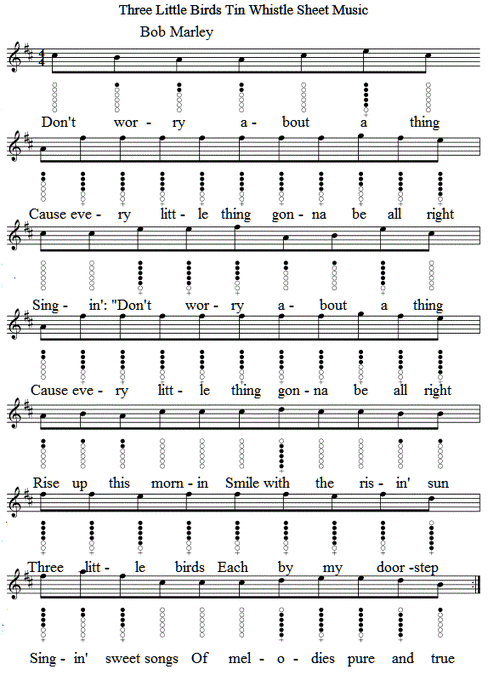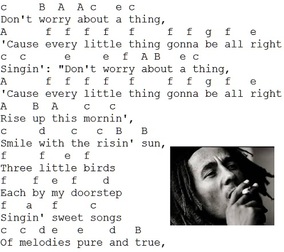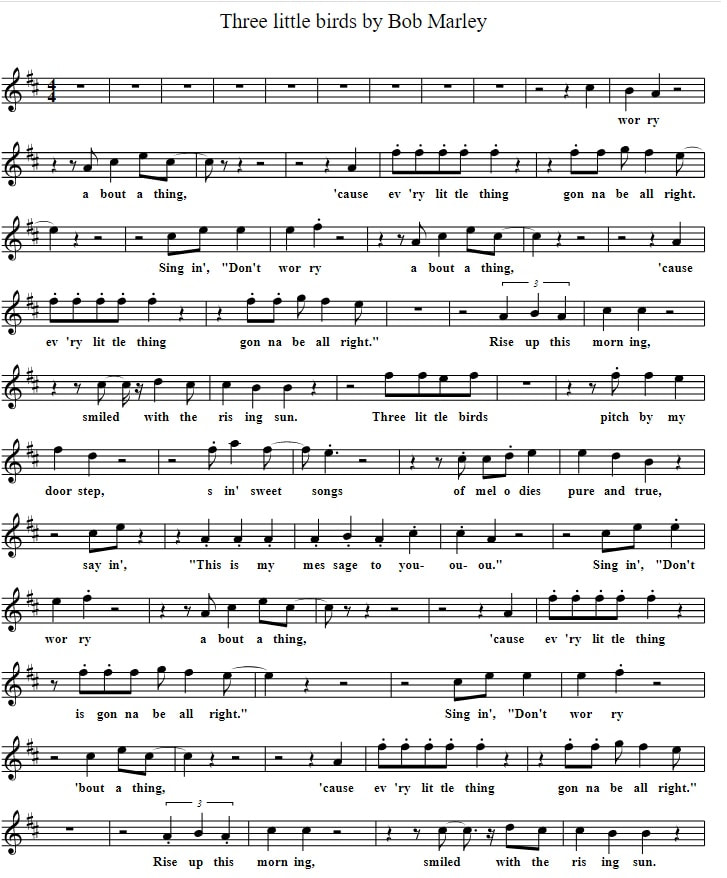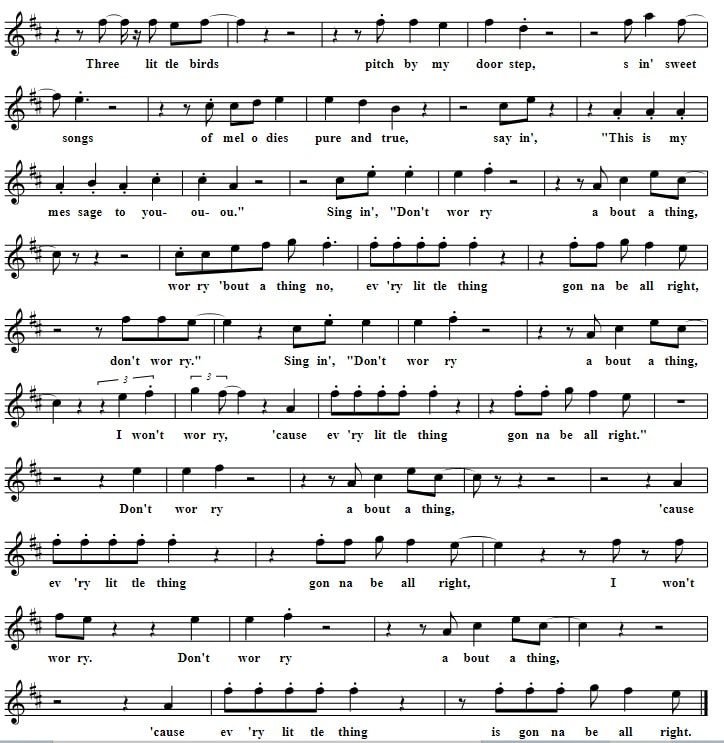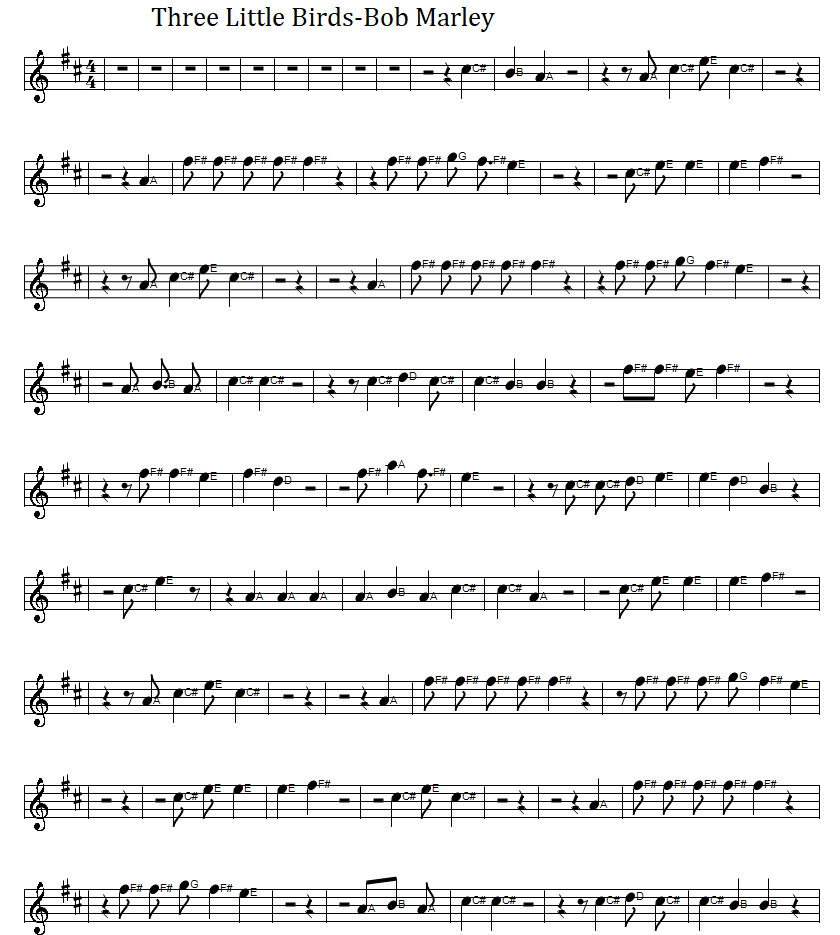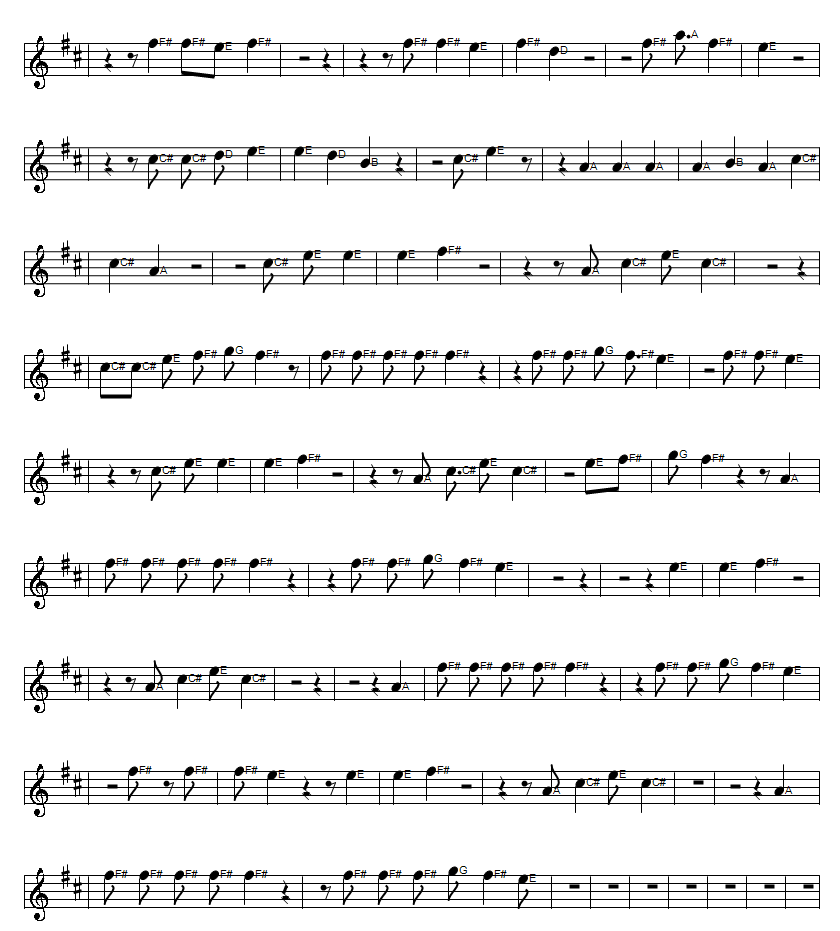Three Little Birds Tin Whistle Sheet Music
in the key of D major. The full sheet music score is also included.A Bob Marley song. This one was a request from the facebook page a while back, [ I'm no longer part of Facebook ]and I'm only now getting around to making it. Reggae music isn't really my cup of tea but I gave it a try. This song forms part of the collection of pop songs for tin whistle that I have put together so far. It goes a little bit high but you can always transpose the tune down to a lower level. Three Little Birds PDF Guitar Tab In D Major included.
Bob Marley is a legendary musician who is known for his influential role in popularizing reggae music and promoting peace and love through his music. Among his extensive discography, one song that stands out in particular is “Three Little Birds”. Released in 1977, this song has become a timeless classic and has been covered by numerous artists over the years. Its simple yet powerful message of hope and resilience has resonated with listeners across generations and cultures. In this thesis, we will explore the impact and significance of “Three Little Birds” in the context of Bob Marley’s life and the socio-political climate of the 1970s.
To fully understand the significance of “Three Little Birds”, it is important to first delve into the background of its creator, Bob Marley. Born in Jamaica in 1945, Marley grew up in a poverty-stricken community and was exposed to the struggles and injustices faced by the working class and people of color. This experience would later influence his music and his advocacy for social change. Marley’s musical career began in the late 1960s when he formed the band, The Wailers, with his childhood friends Peter Tosh and Bunny Wailer. Together, they created music that blended elements of reggae, ska, and rock, with lyrics that reflected the political and social issues of their time.
In the 1970s, Jamaica was undergoing political turmoil and violence due to the ongoing struggle for independence and power between rival political parties. Amidst this chaos, Marley emerged as a prominent figure and his music became a source of hope and inspiration for the Jamaican people. “Three Little Birds” was released during this tumultuous period and its message of peace and positivity provided a much-needed respite for the people of Jamaica.
The lyrics of “Three Little Birds” are simple yet profound. The song speaks of three little birds singing a message of “don’t worry about a thing, ‘cause every little thing gonna be alright”. This message of reassurance and encouragement is a reflection of Marley’s Rastafarian beliefs, which emphasize hope and faith in the face of adversity. The use of the word “little” in the song can also be seen as a way of downplaying the overwhelming problems faced by society, and instead, focusing on the small acts of kindness and positivity that can bring about change.
Furthermore, the lyrics of “Three Little Birds” can also be interpreted as a call for unity and solidarity. The repetition of “every little thing gonna be alright” throughout the song serves as a reminder that no matter how difficult the situation may seem, there is always hope and strength in coming together as a community. This message is particularly relevant to the socio-political climate of the 1970s, where divisions and violence were tearing communities apart. Marley’s lyrics served as a unifying force, bringing people together through a shared sense of hope and positivity.
The impact of “Three Little Birds” extends far beyond the borders of Jamaica and has resonated with listeners worldwide. The song has been covered by numerous artists, including Paul Simon, Sean Paul, and Ziggy Marley, Bob Marley’s son. Its popularity has also transcended time, as it continues to be played on the radio and used in popular culture, including movies, television shows, and commercials. This is a testament to the enduring power of Marley’s music and the universal appeal of “Three Little Birds”.
In conclusion, “Three Little Birds” is a song that encapsulates the essence of Bob Marley’s music and message. Its simplicity and universality have made it a timeless classic that continues to inspire and uplift listeners across generations. Through this song, Marley’s message of hope, resilience, and unity continues to live on, spreading positivity and love to all who listen. As Marley himself once said, “One good thing about music, when it hits you, you feel no pain”. This statement rings true for “Three Little Birds” and its impact on the world, making it a true testament to the legacy of Bob Marley.
To fully understand the significance of “Three Little Birds”, it is important to first delve into the background of its creator, Bob Marley. Born in Jamaica in 1945, Marley grew up in a poverty-stricken community and was exposed to the struggles and injustices faced by the working class and people of color. This experience would later influence his music and his advocacy for social change. Marley’s musical career began in the late 1960s when he formed the band, The Wailers, with his childhood friends Peter Tosh and Bunny Wailer. Together, they created music that blended elements of reggae, ska, and rock, with lyrics that reflected the political and social issues of their time.
In the 1970s, Jamaica was undergoing political turmoil and violence due to the ongoing struggle for independence and power between rival political parties. Amidst this chaos, Marley emerged as a prominent figure and his music became a source of hope and inspiration for the Jamaican people. “Three Little Birds” was released during this tumultuous period and its message of peace and positivity provided a much-needed respite for the people of Jamaica.
The lyrics of “Three Little Birds” are simple yet profound. The song speaks of three little birds singing a message of “don’t worry about a thing, ‘cause every little thing gonna be alright”. This message of reassurance and encouragement is a reflection of Marley’s Rastafarian beliefs, which emphasize hope and faith in the face of adversity. The use of the word “little” in the song can also be seen as a way of downplaying the overwhelming problems faced by society, and instead, focusing on the small acts of kindness and positivity that can bring about change.
Furthermore, the lyrics of “Three Little Birds” can also be interpreted as a call for unity and solidarity. The repetition of “every little thing gonna be alright” throughout the song serves as a reminder that no matter how difficult the situation may seem, there is always hope and strength in coming together as a community. This message is particularly relevant to the socio-political climate of the 1970s, where divisions and violence were tearing communities apart. Marley’s lyrics served as a unifying force, bringing people together through a shared sense of hope and positivity.
The impact of “Three Little Birds” extends far beyond the borders of Jamaica and has resonated with listeners worldwide. The song has been covered by numerous artists, including Paul Simon, Sean Paul, and Ziggy Marley, Bob Marley’s son. Its popularity has also transcended time, as it continues to be played on the radio and used in popular culture, including movies, television shows, and commercials. This is a testament to the enduring power of Marley’s music and the universal appeal of “Three Little Birds”.
In conclusion, “Three Little Birds” is a song that encapsulates the essence of Bob Marley’s music and message. Its simplicity and universality have made it a timeless classic that continues to inspire and uplift listeners across generations. Through this song, Marley’s message of hope, resilience, and unity continues to live on, spreading positivity and love to all who listen. As Marley himself once said, “One good thing about music, when it hits you, you feel no pain”. This statement rings true for “Three Little Birds” and its impact on the world, making it a true testament to the legacy of Bob Marley.
In the letter notes version below the notes up until the B are in capital letters and the ones in lower case are the high notes. All the c and f notes are sharp, which means if your playing this on piano you should use the black keys for the c and f.
Three Little Birds Easy Letter Notes For Beginners
Three Little Birds Sheet Music By Bob Marley In The Key Of D Showing Letter Notation
